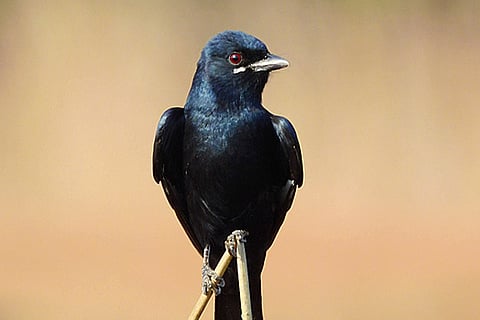

Chennai
The black Drongo, a terrestrial bird commonly found in suburbs and rural areas feeds on locust and grasshoppers and is a biological enemy of locust. According to biologists at the Forest Department here, the twin-tailed drongo feasts on grass hopers and can curtail the spread of locust invasion. “Drongo can eat up to 150 insects per hour and there are birds like roller jay, woodpecker, golden oriole that can devastate the breeding hoppers before the eggs are hatched. There are also insects like damsel bugs and praying mantis that feeds on locusts. Their impact in controlling the grasshoppers should also be studied,” an official said. However, biologists admit that the birds can only control such attacks and cannot stop a massive locust invasion. “It is a fact that we are losing the bird diversity that checks insect and pest invasion. Rather than taking aerial spraying of pesticide and larvicide to fight locust, the government should explore biological ways of fighting locust swarms,” explains taxonomist D Narasimhan, who is also an expert in Ethnobotany.
According to him, Tamil Nadu has reported painted grasshopper attack but as it feeds on weeds it is considered less harmful when compared to the hyperactive desert locust.
“As these are a rare phenomenon that occurs once in decades, we often ignore them without in-depth studies,” said N Krishnakumar, former principal chief conservator of forests. “There must be in-depth studies on birds and damage caused by pests and insects. Effective monitoring of insect biodiversity is crucial for agriculture and agroforestry,” he added.
According to a warning bulletin issued by locust warning centre, in Jodhpur, there are 10 important species of locusts in the world, out of these four types of locusts are recorded in India.
Visit news.dtnext.in to explore our interactive epaper!
Download the DT Next app for more exciting features!
Click here for iOS
Click here for Android